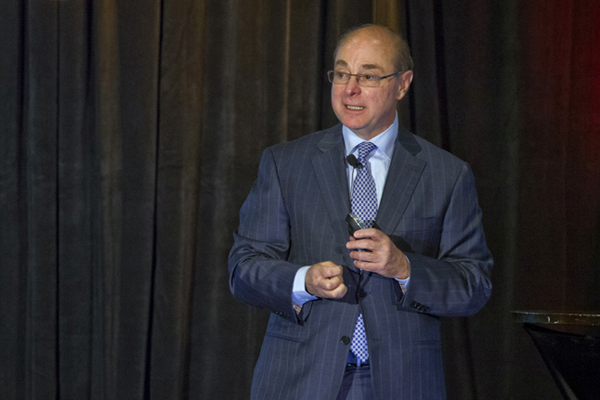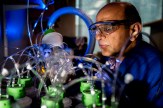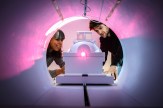Synergy in Seattle

Northeastern University President Joseph E. Aoun told Seattle-area industry, education and political leaders Wednesday night that the university’s new graduate campus in the city’s South Lake Union section will create a synergy with the region that leverages their combined strengths and creates solutions to regional and global challenges.
Aoun served as the keynote speaker at the Seattle Regional Leadership Conference 2012 on the first night of the three-day event, sponsored by the Seattle Metropolitan Chamber of Commerce.
“We are beginning to see profound shifts in higher education,” Aoun said. “Due to technology and other innovations, we are moving from a vertically integrated enterprise to a horizontal enterprise. This has many implications for higher education and for society as a whole.”
More and more, Aoun added, institutions must show clear measures of outcomes that differentiate them and prove their value in this changing landscape.
“In this new environment, the institutions that will succeed are those that can be nimble, entrepreneurial and strategic,” said Aoun, whose leadership in higher education includes his role as board chair of the American Council on Education. “The new leaders will be those that can find synergy between their areas of expertise and the locales in which they choose to operate.”
To meet these challenges, Northeastern has launched a system of graduate campuses across the U.S., starting with Charlotte, N.C., and Seattle, where a new graduate campus will open early next year. These campuses incorporate a hybrid delivery model combining classroom and online learning with a focus on degree programs tailored to meet the needs of the local economy and leverage industry collaborations.
In selecting Seattle, Northeastern recognized the city’s innovative employers and strong economy. The graduate campus will offer 15 tailored degree programs that align with Seattle’s key industries and employers, including science and technology; health care and education; policy and administration; and business.
The graduate campus system dovetails with Northeastern’s signature experiential-education model, grounded in its co-op program, Aoun said, adding that today students are working in 92 countries for nearly 3,000 employers worldwide.
Aoun said Northeastern’s areas of leadership align with Seattle’s industry strengths. He pointed to the city’s concentration of STEM (science, technology, engineering and mathematics) industries and the university’s commitment to STEM-related degree programs. He went on to draw a comparison between Northeastern’s focus on research in global health, technology, defense and sustainability and Seattle’s reputation as the epicenter of research, scholarship and commerce in those same areas.
Northeastern’s commitment to building an innovative and extensive library of professional master’s programs, he added, matches the push in Seattle to increase the number of people in the region to attain graduate degrees.
Aoun said this match has already produced a partnership between Northeastern’s Global Health Initiative and Seattle Biomed to develop new drugs to fight neglected tropical diseases.
“What we seek to achieve is a real relationship, a meaningful partnership and an alliance that unites us in common cause in ways that not only strengthen each other, but the entire community,” Aoun said.





